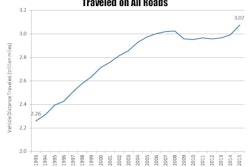
A bipartisan group of senators has introduced legislation that would spend $275 billion over the next six years on the nation's roads, as lawmakers scramble to prevent an interruption in federal infrastructure spending next month.
The measure, known as the Developing a Reliable and Innovative Vision for the Economy (DRIVE) Act, calls for appropriating nearly $43 billion per year to the federal government's highway aid program. The spending would be contingent upon lawmakers coming up with a way to pay for it.
The federal government's transportation spending is typically funded by a combination of gas tax receipts and transfers from other areas of the budget. Lawmakers are facing a July 31 deadline for the expiration of the current infrastructure measure, but are deadlocked about how to pay for an extension.
The sponsors of the Senate bill said it is time for Congress to find a long-term solution to the problem.
“Our nation’s roads and highways have suffered under too many short-term extensions, which have led to higher costs, more waste, and less capability to prioritize major modernization projects to address growing demands on our interstates," said Sen. Jim Inhofe (R-Okla.), who is chairman of the Senate Environment and Public Works Committee.
"The DRIVE Act will provide states and local communities with the certainty they deserve to plan and construct infrastructure projects efficiently," he added.
Democrats who are co-sponsoring the multi-year transportation funding bill offered similar praise, but also sought to put pressure on Republican appropriations to come up with a way to pay for the measure.
“One of the most important things we do as members of Congress is to help provide Americans with a transportation system that is worthy of this country,” Sen. Tom Carper (D-Del.) said in a statement.
“Our work, however, is not finished," Carper continued. "In order to make the DRIVE Act a reality, we must provide full funding so that city, state and local governments have the certainty they need to make the investments we’ve outlined in this bill."
Lawmakers have grappling for the better part of a decade with a gap in transportation funding that is estimated to be about $16 billion per year.
The federal government typically spends about $50 billion per year on transportation projects, but the gas tax only brings in approximately $34 billion annually.
As a result of the shortfall, Congress has not passed an transportation bill that last longer than two years since 2005.
Read the full report at The Hill.
"Getting beyond the gridlock that has been strangling federal investment in the nation’s mobility is going to take bipartisan cooperation and leadership," says American Road & Transportation Builders Association (ARTBA) President & CEO Pete Ruane. "Now it’s time for the Senate Finance and House Ways & Means committees to do theirs and provide the path forward with a sustainable revenue stream for the Highway Trust Fund. Transportation investment is a core federal responsibility. It’s time to transcend politics and do the right thing for America.”



















